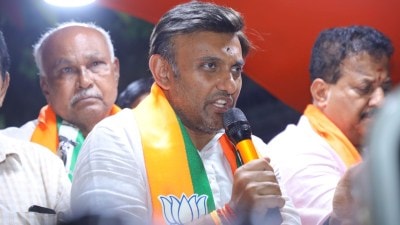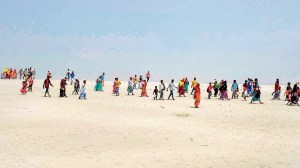- India
- International
Bhavkhedi: Absence of remorse disturbing sign of indifference to violence against Dalits
Remorse and guilt are important emotional resources available to a society or a nation for recovery after going through a trauma. In the case of atrocities against the Scheduled Castes, public recognition of their trauma is rarely granted.
 The truth of Bhavkhedi is that there is more hatred around than we realise.
The truth of Bhavkhedi is that there is more hatred around than we realise.
Written by Krishna Kumar
The recent killing of two Schedule Caste children in Bhavkhedi village in Shivpuri district of Madhya Pradesh brings into focus a larger social reality. A formal inquiry into this incident is likely to proceed along two lines. They are both relevant from a legal perspective and are sure to affect the judicial outcome of the murder case. One line of inquiry is the local history of relations between the scheduled caste families and the higher placed “other backward classes”. Reports show that the person who fatally hit the children on their heads belongs to the latter social category. The other line of inquiry will interpret the spate of anger he felt when he saw the two children defecating by the roadside. The prosecution and the defence will look at the anger that the sight of open defecation occasioned in the mind of the accused. Contrasting arguments will enable the case to proceed in a customary manner. We can be sure, however, that the judicial verdict on the crime committed will not cover the deeper ground this incident reveals.
It is a tempting thought that the incident is specific to this particular area of MP. An equally reasonable temptation is to think that the old problem such incidents reflect is now confined to rural areas. Several commentators have taken the second line, but the first is not altogether unpopular. The fact that both lines are reasonable strengthens our endurance for the horrible death of the two children. The basic elements of the story — village, poverty, caste division and dominance — do indeed assure us that we need not feel unwarrantably disturbed or alarmed. As readers, we have gone through several similar reports of terrible cruelty against victims of caste or religious prejudice.
In addition to these familiar social triggers of violent anger, the Bhavkhedi story offers a third basis to comprehend the incident. It refers to the national drive against open defecation. Bhavkhedi has attained the status of an “no open defecation” village. Status tags of this kind are not new. Murderous rage at the sight of two children indulging in an officially eradicated practice is.
Remorse and guilt are important emotional resources available to a society or a nation for recovery after going through a trauma. In the case of atrocities against the Scheduled Castes, public recognition of their trauma is rarely granted. A visit by political leaders is all that happens in a few cases that gain prominence and visibility. Society delegates to its leaders the responsibility to convey remorse. Visits by social activists and journalists sometimes play this role, demonstrating society’s formal concern. Expression of collective guilt or glani for atrocities on the Scheduled Castes is rare, both at the local and national levels. Society just does not stop its normal activities to find time, howsoever short, to worry about the absence of any such guilt. The Bhavkhedi incident is no exception. We will just move on, as they say we must, after any outrage.

Both children were studying at the local government school. Correspondents who visited the school have reported that caste discrimination is a routine matter. The teacher in charge is reported to have said that Dalit and OBC children don’t sit together or eat their mid-day meal together. A child from the latter category talked about the behaviour he has learnt at home with regard to the presence of Dalits in his class. If he happens to touch them, he said, he is supposed to wash his hands. News reporters have also talked about the display of caste-wise data on the school wall. This practice is not new, and the bureaucracy that governs the school system considers it necessary. If you ask a state-level official, he will tell you that caste-wise and gender-wise display of numbers enrolled and present ensures transparency. The matter is regarded exclusively from the point of view of governance, not in terms of the impact it might make on children.
Similar practices are followed for the monthly distribution of scholarships. The day the scholarship money comes, the teacher calls aloud the names of the Scheduled Caste children, asking them to get up and collect their money. No one thinks this can be done more discretely. Caste is treated as something routine and real, not worth hiding for the sake of higher ideals. Routinised recognition of caste and religion is at the heart of school governance. It helps to conceal prejudice and hatred. In any case, no one has time to encourage empathy in our schools. Local or national happenings that may cause pain are simply ignored. A school runs like an office; reflection on what is happening around it is not among its jobs. Studying the prescribed syllabus and preparing for the exam are.
It is hard not to think of Gandhi in the context of Bhavkhedi incident. It occurred barely a week before Gandhi’s 150th birth anniversary. But irony means something only when it is felt. Gandhi is a global icon of non-violence, and his birthday is recognised by the UN as Ahimsa Day. But, of course, it is a date like any other. Last year, a murder that was internationally recognised for its brazen horror occurred on October 2. Even the UN chose to ignore this coincidence perhaps because the murder of journalist Jamal Khashoggi immediately became a political matter.
As the 150th year of Gandhi’s birth progressed, numerous collective killings took place in our country, indicating that the value that Gandhi held dear was not doing well. Nor is his constructive programme for alleviating the suffering of the castes involved in sanitation. Death in a sewer while it was being cleaned has become a familiar episode in our cities. That such deaths fail to evoke even a temporary public outrage indicates a culturally entrenched contempt. The truth of Bhavkhedi is that there is more hatred around than we realise.
The writer, professor of education at University of Delhi, was director of NCERT from 2004 to 2010
— This article first appeared in the October 9, 2019 print edition under the title ‘Learning from Bhavkhedi’
EXPRESS OPINION
More Explained
Apr 27: Latest News
- 01
- 02
- 03
- 04
- 05











































